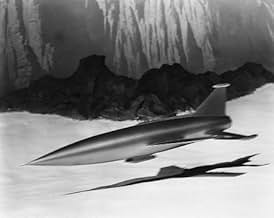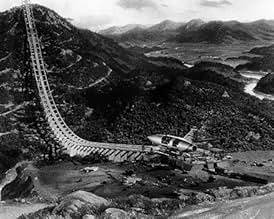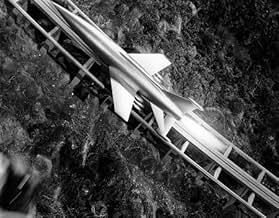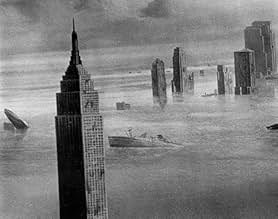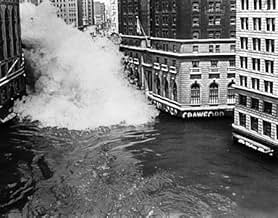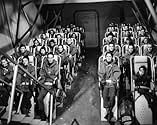VALUTAZIONE IMDb
6,6/10
9990
LA TUA VALUTAZIONE
Aggiungi una trama nella tua linguaAs a new star and planet hurtle toward a doomed Earth, a small group of survivalists frantically work to complete the rocket which will take them to their new home.As a new star and planet hurtle toward a doomed Earth, a small group of survivalists frantically work to complete the rocket which will take them to their new home.As a new star and planet hurtle toward a doomed Earth, a small group of survivalists frantically work to complete the rocket which will take them to their new home.
- Regia
- Sceneggiatura
- Star
- Vincitore di 1 Oscar
- 2 vittorie e 1 candidatura in totale
Peter Hansen
- Dr. Tony Drake
- (as Peter Hanson)
Rachel Ames
- Julie Cummings
- (as Judith Ames)
Kirk Alyn
- Rioter Bringing Guns
- (non citato nei titoli originali)
Gertrude Astor
- Traveler
- (non citato nei titoli originali)
Mary Bayless
- Club Patron
- (non citato nei titoli originali)
Nina Borget
- Translator
- (non citato nei titoli originali)
Steve Carruthers
- Delegate
- (non citato nei titoli originali)
Robert Chapman
- Student
- (non citato nei titoli originali)
Gene Collins
- Newsdealer
- (non citato nei titoli originali)
James Congdon
- Eddie Garson
- (non citato nei titoli originali)
Recensioni in evidenza
George Pal, Hungarian born Puppetoon creator and fantasy legend made several great science fiction space movies. Adaptations of popular books in the 50's included former German rocket scientist Willy Ley's "Conquest Of Space" using designs and ideas illustrated by space artist Chestley Bonestell, who's work is seen in almost all of Pal's space films in one way or another, considered cutting edge for the time. His others included H.G.Wells classic "War Of The Worlds", Robert Heinlein's "Destination Moon" and the Edwin Balmer & Philip Wylie 1932 novel "When World's Collide".
The results still stand as seminal classics of science fiction filmwork, often copied, referenced and paid homage in one way or another. Although perhaps dated by the computer generated, digitally enhanced SFX of today's so-called masterpieces, these films still stand out as the major influences which helped shape our dream, visions and often spoke to our deepest fears, such as the end of the world.
From the inverted ski jump launch system (used today on aircraft carriers), to expendable booster rockets (a Space Shuttle standard), the Ark spaceship spawned the imagination of many filmakers, including some who reused the model for other films such as "Flight To Mars" and "The Queen Of Outer Space". The movie still stands as a milestone as the first science fiction disaster movie.
Once again, Leith Stevens' musical score enriches the experience, as it did for Pal's previous space adventure, "Destination Moon". The film's special effects won it the Oscar in 1951. All this, and in the rich tones of Technicolor that shall never been seen in a first run movie theater again. Thank you Lord for revival houses that still manage to seek out old time prints for festivals (the Alamo Drafthouse in Austin, Texas comes to mind).
There still remains a bit of controversy, though, about the film's ending. A wide, panoramic Bonestell matte painting is seen from the hatch of the newly arrived Ark. In the image can be seen two clearly pyramidal mountains in perfect proportions, as if artificial, as well as the base of what appears to be a building constructed by an alien intelligence. Although the actors don't react to this (the matte effect added in post production), the artwork hints at the planet Zyra as being inhabited (In the novel, the planet is known as Bronson Beta, and is indeed found to be once inhabited, and is explored further in the sequel "After Worlds Collide").
In the 1970s, producers Richard Zanuck and David Brown attempted to do a remake, which eventually mutated into the 1998 film, "Deep Impact". As in "When Worlds Collide", the human interaction was as important as the science fiction elements.
The results still stand as seminal classics of science fiction filmwork, often copied, referenced and paid homage in one way or another. Although perhaps dated by the computer generated, digitally enhanced SFX of today's so-called masterpieces, these films still stand out as the major influences which helped shape our dream, visions and often spoke to our deepest fears, such as the end of the world.
From the inverted ski jump launch system (used today on aircraft carriers), to expendable booster rockets (a Space Shuttle standard), the Ark spaceship spawned the imagination of many filmakers, including some who reused the model for other films such as "Flight To Mars" and "The Queen Of Outer Space". The movie still stands as a milestone as the first science fiction disaster movie.
Once again, Leith Stevens' musical score enriches the experience, as it did for Pal's previous space adventure, "Destination Moon". The film's special effects won it the Oscar in 1951. All this, and in the rich tones of Technicolor that shall never been seen in a first run movie theater again. Thank you Lord for revival houses that still manage to seek out old time prints for festivals (the Alamo Drafthouse in Austin, Texas comes to mind).
There still remains a bit of controversy, though, about the film's ending. A wide, panoramic Bonestell matte painting is seen from the hatch of the newly arrived Ark. In the image can be seen two clearly pyramidal mountains in perfect proportions, as if artificial, as well as the base of what appears to be a building constructed by an alien intelligence. Although the actors don't react to this (the matte effect added in post production), the artwork hints at the planet Zyra as being inhabited (In the novel, the planet is known as Bronson Beta, and is indeed found to be once inhabited, and is explored further in the sequel "After Worlds Collide").
In the 1970s, producers Richard Zanuck and David Brown attempted to do a remake, which eventually mutated into the 1998 film, "Deep Impact". As in "When Worlds Collide", the human interaction was as important as the science fiction elements.
This is one of the least known sci-fi movies from the 1950s, but it's one of the best of the era. The great thing about this movie is that it concerns the lives of the characters and their personal problems.
The plot is about a group of researchers that after a trip in Africa discover some shocking news, that the star Bellus will collide to Earth, destroying the planet. Soon they begin to build a giant rocket ship that will take a group of survivors in Zyra, a safer planet.
The best part of the movie (for me) was the part of all the cataclysms (mountains crumbling, giant sea waves, the Brooklyn Bridge auto-destroying in pieces), and the music fits with the viewer's emotions. I also liked the chemistry between the two main characters (Richard Derr and Barbara Rush), especially in the night-club scene. And the ending is very superb for a 1951 sci-fi movie!
This is a sci-fi movie that every sci-fi fan must see almost once in their life.
The plot is about a group of researchers that after a trip in Africa discover some shocking news, that the star Bellus will collide to Earth, destroying the planet. Soon they begin to build a giant rocket ship that will take a group of survivors in Zyra, a safer planet.
The best part of the movie (for me) was the part of all the cataclysms (mountains crumbling, giant sea waves, the Brooklyn Bridge auto-destroying in pieces), and the music fits with the viewer's emotions. I also liked the chemistry between the two main characters (Richard Derr and Barbara Rush), especially in the night-club scene. And the ending is very superb for a 1951 sci-fi movie!
This is a sci-fi movie that every sci-fi fan must see almost once in their life.
"THERE ARE MORE STARS IN THE HEAVENS THAN PEOPLE ON EARTH!" a portentous voice-over intones amidst the background of a celestial choir. And with that very important fact established for those in the audience that might actually believe otherwise, we're off and running. Some movies are so loopy they're just plain fun to watch no matter how absurd they are. And with an opening like the one described you know this George Pal gem is going to be a hoot. "When Worlds Collide" was Pal's follow-up to his successful "Destination Moon" which along with "Rocketship-XM" launched the Golden Age of fifties sci-fi. It was a simpler time, an era in science-fiction films when all that was required for space travel was to "Strap yourselves in!" and "contract your muscles!" When astronauts wore leather flight jackets instead of space suits, and were always on the make for a beautiful pair of gams, (i.e. women) when all scientists smoked pipes and wore goatees, (that's how you knew they were intelligent) and were completely absorbed in their ivory tower research, oblivious to everything including at times the safety of the world. Worse whenever some dangerous creature was running amok their response to stopping it was invariably, "It shouldn't be destroyed, it should be studied!" or "It's so much wiser than us, we can learn so much!" It was an era when a woman wasn't considered complete without a man in her life, and even if she was a brilliant astrophysicist, all she really needed to know (as every man knew) was how to make a decent pot of coffee, when radiation was the answer to any problem, as in "Beast from 20,000 Fathoms" or was the reason for every problem like the giant ants in "Them!" Well, with the exception of extraterrestrials, radiation and giant insects, "When Worlds Collide" has all this and more!
This film is so ripe some enterprising filmmaker could do a parody of it, except it's hard to imagine how it could be done better. Eminent astronomer, Dr. Emery Bronson, (pipe smoking and goateed) has made a terrible discovery from his remote ivory tower observatory in South Africa. Two "heavenly bodies" are on a collision course with Earth. One, called Zyra will pass close enough to wreak havoc on land and sea, while the other, called Bellus will actually strike the planet and destroy it days later. "Money doesn't mean anything now. Time is all that matters!" So the pertinent, secret data must be taken at once to Professor Hendron in New York for corroboration on the Differential Analyzer, a fifties version of the computer. Enter Dave Randall, a leather flight jacket wearing pilot-soon-to-be-astronaut. Dave is always on the make for a beautiful pair of gams sort of guy, and blissfully unaware of the bad news he is carrying. At the airport Professor Hendron's daughter Joyce, played with wonderful vapidity by Barbara Rush awaits him. A newspaperman has offered Randall $5,000.00 for the secret of the little black box handcuffed to him. But Dave takes one look at Joyce and like a starving man eyeing a sirloin steak tells the reporter, "No thanks, I'm working on a better offer!" With the clock ticking on humanity they decide to take a taxi through the New York traffic to the breathlessly waiting professor. Along the way Randall manages to coax out of the trusting Joyce, who evidently never heard the expression, "loose lips sink ships" that the end of the world is upon them. Rush exclaims, "I'm frightened!" And then in one of the film's choice bits, slowly faces the camera and exclaims deadpan, "You see, I haven't the courage to face the end of the world!" The music swells, Randall squirms as if he just sat in something smelly left behind by a pet, slow fade out.
Most of the film deals with the construction of the rocket-ship, a latter day Noah's Ark, which will carry 44 individuals picked by lottery to make a new home on Zyra. It's their hope to build a bright shining new white world-literally for there is nary a single member of a minority group to be found among them. But money is needed for the project and since the Federal Government can't be bothered with saving humanity, wealthy industrialist Sidney Stanton, supplies that-provided he has a seat reserved aboard. "I think you're all crackpots!" he hisses. "Build it!" John Hoyt, deliciously nasty as the wheelchair bound Stanton steals the film. The cheesy but fun special effects kick into high gear with the approach of Zyra. Tidal waves strike New York, earthquakes rock the planet, and volcanoes erupt while the celestial choir swells yet again as a solemn voice-over intones, "Never has humanity felt so close to God!" Hendron reproaches Stanton with, "Not your sort of hypocritical prayer but the kind that come from deep inside a man!" after the latter has gunned down his wormy manservant Ferris who made the mistake of telling his employer he was an "Easy man to hate!" Things go from bad to worse when those who lost the lottery decide to riot. The good news is that Joyce realizes she loves Dave, and best of all he gets to go along and fly the craft to Zyra. Alone with Joyce days before take off and the end of the world, he remarks with all the gravity and emotion of a man suffering from acute gastric discomfort, "The last sunrise!" Joyce tries to get him to look on the bright side, "The same sun will rise again on the new world!" she says, not the least bit distressed that several billion people are about to have their lives snuffed out in a cataclysm of cosmic proportions. Oh well, guess she'll make a pot of coffee.
Everything turns out "alright" in the end-all things considered. Cue celestial choir, fade out. "When Worlds Collide" is a fun, goofy, glorious science-fiction postcard from the early fifties.
This film is so ripe some enterprising filmmaker could do a parody of it, except it's hard to imagine how it could be done better. Eminent astronomer, Dr. Emery Bronson, (pipe smoking and goateed) has made a terrible discovery from his remote ivory tower observatory in South Africa. Two "heavenly bodies" are on a collision course with Earth. One, called Zyra will pass close enough to wreak havoc on land and sea, while the other, called Bellus will actually strike the planet and destroy it days later. "Money doesn't mean anything now. Time is all that matters!" So the pertinent, secret data must be taken at once to Professor Hendron in New York for corroboration on the Differential Analyzer, a fifties version of the computer. Enter Dave Randall, a leather flight jacket wearing pilot-soon-to-be-astronaut. Dave is always on the make for a beautiful pair of gams sort of guy, and blissfully unaware of the bad news he is carrying. At the airport Professor Hendron's daughter Joyce, played with wonderful vapidity by Barbara Rush awaits him. A newspaperman has offered Randall $5,000.00 for the secret of the little black box handcuffed to him. But Dave takes one look at Joyce and like a starving man eyeing a sirloin steak tells the reporter, "No thanks, I'm working on a better offer!" With the clock ticking on humanity they decide to take a taxi through the New York traffic to the breathlessly waiting professor. Along the way Randall manages to coax out of the trusting Joyce, who evidently never heard the expression, "loose lips sink ships" that the end of the world is upon them. Rush exclaims, "I'm frightened!" And then in one of the film's choice bits, slowly faces the camera and exclaims deadpan, "You see, I haven't the courage to face the end of the world!" The music swells, Randall squirms as if he just sat in something smelly left behind by a pet, slow fade out.
Most of the film deals with the construction of the rocket-ship, a latter day Noah's Ark, which will carry 44 individuals picked by lottery to make a new home on Zyra. It's their hope to build a bright shining new white world-literally for there is nary a single member of a minority group to be found among them. But money is needed for the project and since the Federal Government can't be bothered with saving humanity, wealthy industrialist Sidney Stanton, supplies that-provided he has a seat reserved aboard. "I think you're all crackpots!" he hisses. "Build it!" John Hoyt, deliciously nasty as the wheelchair bound Stanton steals the film. The cheesy but fun special effects kick into high gear with the approach of Zyra. Tidal waves strike New York, earthquakes rock the planet, and volcanoes erupt while the celestial choir swells yet again as a solemn voice-over intones, "Never has humanity felt so close to God!" Hendron reproaches Stanton with, "Not your sort of hypocritical prayer but the kind that come from deep inside a man!" after the latter has gunned down his wormy manservant Ferris who made the mistake of telling his employer he was an "Easy man to hate!" Things go from bad to worse when those who lost the lottery decide to riot. The good news is that Joyce realizes she loves Dave, and best of all he gets to go along and fly the craft to Zyra. Alone with Joyce days before take off and the end of the world, he remarks with all the gravity and emotion of a man suffering from acute gastric discomfort, "The last sunrise!" Joyce tries to get him to look on the bright side, "The same sun will rise again on the new world!" she says, not the least bit distressed that several billion people are about to have their lives snuffed out in a cataclysm of cosmic proportions. Oh well, guess she'll make a pot of coffee.
Everything turns out "alright" in the end-all things considered. Cue celestial choir, fade out. "When Worlds Collide" is a fun, goofy, glorious science-fiction postcard from the early fifties.
"When Worlds Collide" was one of the first of the Sci-Fi films that ruled the 1950s. Plus,it was in color. The movie was based on the novel of the same name and if I remember correctly, there were two books-part one(which the movie is based on) and part two which describes life on the new planet. An astronomer sees a new sun and planet coming right toward earth and we have less than one year before the new sun collides with us. At first, no one believes him. After a short period of time, several countries build rockets to bring a handful of survivors to the new planet. The interior of the rocket is pretty lame by today's standards but the outside is cool-looking. The paintings are OK but the one at the very end of the film is quite obvious.The acting is good, the plot is terrific and there is a good balance of action and drama. This is a nice film to watch.
...I remember rushing in from playing football in the street to watch the world ending on our little b&W TV. I remember thinking what I would do in that situation? I had nightmares for days after especially about the image of Bellus swallowing the world. Wasn't Bellus a star? Coz Zyra, the planet, sailed past days before causing earthquakes and loads of nasty stuff. It doesn't matter about effects (1951? This was top notch!) but what does matter is that you cared about the characters; the desolation when one engineer gives up his seat because his girl friend wasn't lucky enough to draw a place and was willing to meet his fate with his loved one by his side... THAT'S romance! And that ski-jump take off... and that rocket!!!! It's definitely one of the best of it's genre and everyone else is right.. the recent batch of similar films aren't a patch on this. Remember characterization, chaps! Enjoy...
Lo sapevi?
- QuizScreenwriter Bruce Joel Rubin saw this film as a ten-year-old, and has cited it as "the beginning of the emergence of philosophy" in his life. In The Dialogue: An Interview with Screenwriter Bruce Joel Rubin (2007), he explains that right after he and a boyhood friend saw the film, they spent hours discussing the end of the world. Rubin mentions this memory while explaining that Steven Spielberg approached him to do the screenplay for a remake of "When Worlds Collide," and that it eventually evolved into Deep Impact (1998), with Rubin credited as one of its two writers.
- BlooperThroughout the film, Bellus is referred to as a star; this is presumably how life is able to be sustained on Zyra. However, if this was the case, Earth would have been destroyed from the heat long before Bellus collided with it, even if it was a small brown-dwarf star. Also, departure should have been at least 17 days earlier, before descending deep into Bellus' gravity well and needing far more fuel. This part of the plot, and the time to build the ship, could have been resolved by sticking to the novel's pair of planets and a longer time frame - Zyra and Bellus both passing by with Bellus, a gas giant planet, ripping up Earth's surface, then returning months later for Bellus' direct collision with Earth, as Zyra enters orbit around the sun.
- Citazioni
Sydney Stanton: Your salvation doesn't interest me; mine does.
- ConnessioniEdited from Il falco del Nord (1938)
I più visti
Accedi per valutare e creare un elenco di titoli salvati per ottenere consigli personalizzati
Dettagli
- Data di uscita
- Paese di origine
- Lingue
- Celebre anche come
- Cuando los mundos chocan
- Luoghi delle riprese
- Calabasas, California, Stati Uniti(Rocket Ship Campsite)
- Azienda produttrice
- Vedi altri crediti dell’azienda su IMDbPro
Botteghino
- Budget
- 936.000 USD (previsto)
- Tempo di esecuzione
- 1h 23min(83 min)
- Proporzioni
- 1.37 : 1
Contribuisci a questa pagina
Suggerisci una modifica o aggiungi i contenuti mancanti




